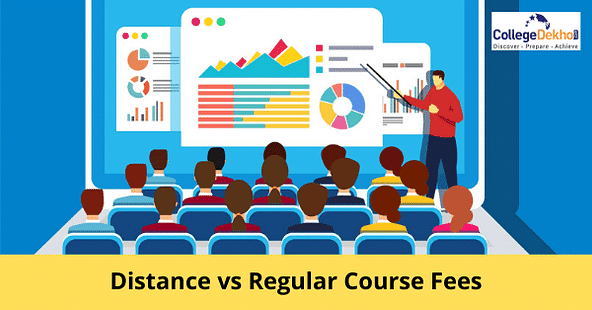Amongst other things, one of the major difference between Distance Learning courses and Regular courses are the respective course fees. Understand the factors that govern course fees of a particular programme and what bust myths around Distance Learning programmes in India.

In earlier days, distance learning programmes were popular with students and working professionals who lacked the time or resources to pursue a full-fledged course in regular mode. Today, with Coronavirus impacting the way we pursue education, distance learning course has become more of a necessity. Traditional distance learning course involved issuing of study material and physical classes for a limited duration (1-3 hours daily or over the weekend). This has evolved into a much more mature version today - Online Distance Learning Programme (ODLP).
And that makes sense too, with all aspects of our existence being maintained digitally, and services and products accessed with a single click of a button, it is just obvious that the ODLP methodology be adopted. With education and learning, in a literal sense, just a touch away, distance learning has become a popular choice among people who aspire to study and learn new things, over attending regular courses.
Apart from ease of access to a sea of information, knowledge and understanding in different disciplines, Distance Education or Distance Learning also makes access to education much cheaper than regular courses. It has been observed that distance education can be accessed at a quarter of the price of accessing a class-based education!
Table of Content | |
|---|---|
In this article, we shall discuss how and why the course fees between Distance Learning and Regular Learning are different. You can also learn about Distance Learning and understand whether it is the right choice for you or not.
Distance Learning vs Regular Learning: Course Fees
As specified above, distance-learning or education has become one of the inexpensively accessible educational portals for people who wish to learn. Here are some of the difference between Distance Learning and Regular Learning courses along with the fees.
| Factors | Regular Classes | Distance Learning |
|---|---|---|
| Infrastructure Cost | Requires investment in infrastructural facilities like computer and machinery costs, library, student extracurricular & life services, health centre fees and other similar costs which contributes to an increase in a student's Annual Fees | Digital infrastructure investment is required, which can be purchased at a cheaper price It's a one-time investment cost incurred in infrastructure + regular up-gradation, which is lower than the cost in Regular mode of education |
| Other Cost | The effort put in by the management, faculty & staff to physically attend to students come at a cost that is charged to the students | Since all communication is handled remotely, there is no additional cost levied on students |
| Practice-Based Learning VS Theory-Based Learning | The curriculum in regular courses is not limited to classrooms only. Educational visits, guest lecture, organisation of events etc. form an important part of regular courses. While this aids in the learning process of students, it cannot be denied that it comes at an additional cost. | Everything is virtual here as technology is used extensively in this ODLP, rather than physical visits which bring the overall cost of pursuing a particular course down. |
These are some of the factors that would affect the course fee of a distance learning programme. There are several factors apart from the ones that have been mentioned above which affect the distance learning course fees. Some of these factors include the popularity of the college offering and course and demand for the course itself. Other factors also include programme outcomes, the ownership of the institute offering the course and many more.
Does Cheaper Course Fee Mean Poor Quality of Education?
Contrary to popular myths, a cheaper course fee does not mean poor quality of education or poor academic standards. In India, there are many accreditation and quality-assurance institutions that ensure that the quality of education is not compromised and students receive equal opportunity in education.
As mentioned above, there many reasons as to why a course fee for a programme could be cheaper when compared to other institutes or courses. However, an inexpensive course fee does not indicate poor quality of education. If anything, ODLP empowers students to use their brains more due to limited access to teachers and less spoon-feeding opportunities.
When considering an institute’s worth, one should consider the placement & status of alumni who have graduated from the institute. In other words, the placement opportunities available to the students and academic performance of the students at the end of a course should be considered as indicators of a good educational institution.
Why Pursue Regular Courses Over Distance Learning Courses?
Even though regular courses are comparatively more expensive than distance learning courses, people still opt for regular courses as the ‘degree’ helps in jump-starting their career. However, regular courses also encourage students to dedicate their time toward education alone.
With Distance Learning Programmes, students receive the ability to pursue a career while also dedicating their time and effort towards their education as well. The opportunity to study while earning allows students to gain practical as well as theoretical knowledge. Pursuing a distance or online learning courses is popular amongst employed youths of the country who do not wish to quit their careers but wish to gain additional knowledge to improve their career prospects.
Top Colleges for Distance Learning Programmes in India
Check out this list of top college for distance learning programmes in India, if you are interested in pursuing online courses or distance learning programmes.
Name of College/University | University Type | State |
|---|---|---|
Private University | Punjab | |
Deemed to be University | Uttarakhand | |
Shri Venkateswara University Gajraula | Private University | Uttar Pradesh |
Deemed to be University | Tamil Nadu | |
Private Institute | Delhi | |
Deemed to be University | Maharashtra | |
Private University | Uttar Pradesh | |
Deemed University | Karnataka | |
Private University | Uttarakhand | |
Deemed to be University | Maharashtra | |
Private Institute | Haryana |
These are just a few of the colleges that offer distance learning programmes in India in various disciplines such as commerce, management, information technology, science and many more. If you are interested in pursuing a distance learning course in India, then you can fill out the Common Application Form available on our website. Our counsellors can help you choose the right course and college, as per your requirements.

















Similar Articles
Top Institutes with 100% Job Placements in 2023-24: Highest Package, Key Recruiters
List of Colleges in Delhi University: Affiliated/ Recognised Colleges in DU
Best Career Options After Qualifying UGC NET 2024
What is a Good Score in UGC NET 2024?
UPSC CSE 2025: Calendar (Out), Posts, Strategy, Registration & More
How to Check KVS Admission List 2024-25 (1st, 2nd, 3rd): Direct Link, Latest Updates, Steps for Class 1 & Above